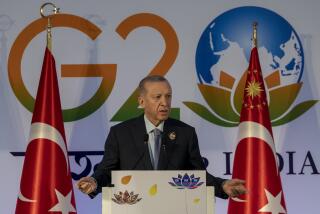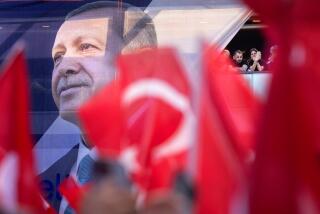Turkey flirts with Tehran
- Share via
Even as Congress pushes legislation aimed at punishing foreign companies that sell petroleum to Iran, and the United Nations prepares to consider sanctions against that country if an ongoing round of nuclear talks fails, Iranian leaders this week were elated over plans to treble trade ties with a key Middle Eastern power.
So which rogue nation is undermining Western efforts to prevent Tehran from obtaining nuclear weapons? Syria, perhaps, or the unpredictable Saudis? Actually, it’s Turkey, a member of NATO, prospective member of the European Union and the United States’ most strategically important Muslim ally.
Turkish Prime Minister Recep Tayyip Erdogan announced plans Wednesday in Tehran to increase trade between the two countries from its current level of about $7 billion to $20 billion by 2011. Turkey and Iran have reportedly reached agreements on power plants, banks and natural gas development that would help make up for any economic pain the United Nations could inflict via tougher sanctions. The deals are fueling worries that Turkey, a model democratic Muslim state and a vital bridge between Europe and the Arab world, is turning its back on the West to embrace Islamist regimes to the east.
Some of those fears are probably overblown. Much has been made, for example, of Turkey’s worsening relations with Israel, which went from lukewarm to frosty after the 2008 Gaza incursion. But that’s just Middle Eastern politics; Erdogan is reflecting popular anger over Gaza and boosting his status at home by bashing Israel. There’s little chance Turkey would jeopardize its ties to the United States and Europe by breaking off relations with Israel.
Yet Ankara’s growing attachment to Tehran is troublesome. Part of the blame can be laid on such European leaders as French President Nicolas Sarkozy, whose opposition to Turkey’s membership in the European Union has inflamed anti-Western sentiment within Turkey. Another factor is the country’s newfound self-confidence. Its economic clout and geopolitical importance have put it in a position to realize long-held desires to be a major player on the world diplomatic stage. Flirting with Iran is a way of asserting independence from the global powers that be.
That self-confidence will probably be on full display Dec. 7, when Erdogan heads to Washington to visit with President Obama. He is expected to be assertive. But Obama needs to do some lecturing of his own. A nuclear-armed Iran is not in Turkey’s interest, and Erdogan’s frequent assurances that Tehran is solely interested in an energy program are either laughably naive or dangerously cynical.
More to Read
Sign up for Essential California
The most important California stories and recommendations in your inbox every morning.
You may occasionally receive promotional content from the Los Angeles Times.










